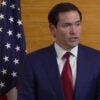Libyan rebels converged on the capital city of Tripoli early on Monday with reports that the forces arrested two of Col. Muammar el-Qaddafi’s sons, that the presidential guard protecting Qadhafi surrendered, and that the rebel forces controlled much of the city with the exception of Qadhafi’s leadership compound. Meanwhile, President Obama released a statement saying the U.S. believes Qadhafi’s regime is nearing its end and that it recognizes the Transitional National Council “as the legitimate governing authority in Libya.”
The Obama Administration, which stumbled into the war in Libya with no clear military plan or exit strategy, now must fashion a suitable and acceptable way forward. The Administration’s short-sighted effort to score a quick and easy military victory over Qadhafi’s regime failed to end the threat to civilians in “days not weeks,” as President Barack Obama promised. The administration now must scramble to develop and implement a long term strategy for a post-Qadhafi Libya.
If the regime suddenly collapses, the United States must be ready to help the rebel Transitional National Council to stabilize Libya, restore the rule of law and prepare the way for an orderly transition to a new representative government. Washington should facilitate postwar reconciliation and consensus-building between the many political, tribal and local factions that have emerged to fill vacuums in Libya left by the collapse of the regime. The United States also can help assist Libya’s reconstruction, particularly the rapid repair of Libya’s damaged oil infrastructure, in order to bring Libyan oil exports back to previous levels as soon as possible.
It will also be necessary to remain vigilantly engaged in Libya to help prevent Islamist forces, which appear to make up a small but not insignificant part of the opposition coalition, from hijacking Libya’s future. Even if Qadhafi soon departs from the scene, Libya is likely to remain a turbulent snake pit with heavily-armed political factions for many years to come.
Click here for more Heritage Foundation publications on Libya.
































2 Replies to “Libyan Rebels Advance on Tripoli: The Approaching Endgame”